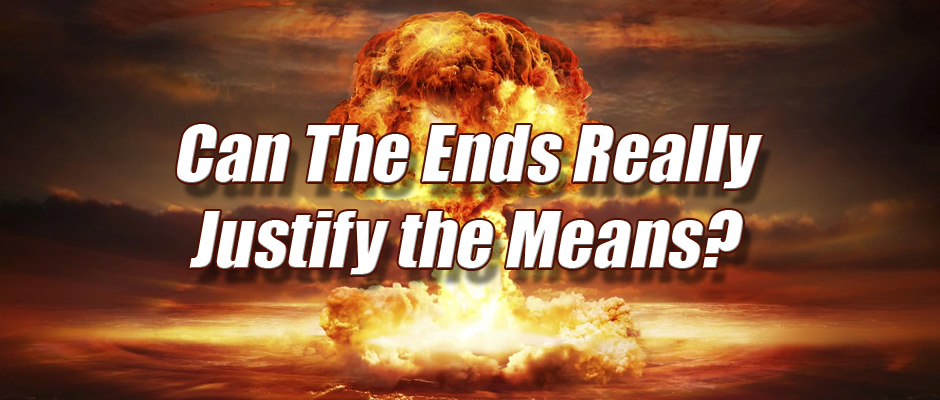An Ethical Question: Can the Ends Justify the Means
This article needs to be presented as an analogy. Not because the concept is hard to grasp but because the idea itself is probably a perspective that is hard to look at and hard to answer. My work is not about taking the easy way out as far as our thoughts and decisions go. Ethical questions are no different. We must ask the tough questions that dig deep into your principles to understand your true positions better. Let us begin.
President Truman ordered the dropping of two atomic bombs on Japan during WW2. Though the numbers are merely estimates, he is believed to have effectively killed 90,000-166,000 people in Hiroshima and another 60,000-80,000 in Nagasaki within the first few months of the bombings alone (Army, 2008). Think about that for a moment.
The bombs fell on Japan, but the deaths were not only military. Most of these deaths were civilian men, women, and children who wanted no part in the conflict. The bomb also killed at least 10 American POWs at the Chugoku Military Police Headquarters (Ove, 2008). So while this act ushered in the end of WW2, we must ask ourselves, “was it ethical”?
Essentially, we are asking, “do the ends justify the means”? It is the old Machiavellian debate, if you will. In other words, can or should someone unleash such horror if the outcome is positive? It almost sounds like the debate of the double negative.
To answer this, we must ask ourselves some very uncomfortable questions to understand the extremes to which this debate has and essentially can ultimately go. Questions such as “If you could cure cancer, and all you had to do was brutally murder a small child, could you do it?” or “if by ending the lives of 200,000 people, you could save millions more, could you do it?”
These questions are okay, I suppose, but they imply that A) the outcome is expected to be good and guaranteed, and B) that someone else will more than likely have to get their hands dirty, and you will not be the one cutting the throats of each individual. The truth is that the result is unknown in both, and assuming it all as a positive is irresponsible.
Let us use Hitler as an example since most are somewhat familiar with this leader. Hitler believed that the Jews were responsible for the collapse of the German economy and the Russian revolution, both of which presented a huge problem for Germany. Furthermore, Hitler viewed this as a continual and ever-increasing problem. Hence, he decided to eradicate the perceived problem from Germany. Did the ends justify the means? Many would say no . . . but then again, Germany lost. (We will leave out the idiocy of Woodrow Wilson in this debate.)
Was Truman ethical when he decided to kill civilians or his own compatriots? I’m going to say no. In a war, you have two sides of military personnel trying to inflict as much damage as possible upon the enemy while the enemy is trying to do the same in return. Generally speaking, civilians are supposed to be left out of the equation to avoid collateral damage. This is because the mass murder of civilians is considered a war crime and a crime against humanity (Ditcham, 2004). The problem is that the winners rarely suffer the consequences of their actions, while the losers suffer greatly. Truman and WW2 are the best examples of this. Both sides killed way too many civilians, but only one side was considered heroic and avoided such charges. Hypocrisy?
For me, this is simple; if one has to ask whether or not actions are ethical or if the ends can justify the means, chances are there is probably an excellent argument to the contrary. This is furthered by the idea that something as simple as lying or deception might be okay if the result is positive, such as lying to get a job or hiding something negative from a potential partner. Such instances are usually short-lived and eventually discovered. Consequences usually follow. In turn, the outcome is usually a negative one, if at the very least, as far as peer perception goes.
Ultimately, it boils down to perception, perspective, and morality. What does this article mean to you? What is the bigger question at play? It is rather basic. Ask yourself the following questions:
Is it okay for someone to infringe on the Constitution of the United States for the sake of convenience or monetary gain? Can the ends possibly justify the means if both the means and the ends are unconstitutional? Morally and ethically speaking, should you sit idly by when you know it is unconstitutional, but the government persuades you with rewards for remaining silent? Should we drop our Constitutional heritage to attempt some social utopia that can never be realized?
This is where we are today. As demonstrated repeatedly in my work, our Constitution is under fire. Our principles are under fire. Many in this great nation have sold their freedoms for temporary monetary benefit with little regard for their fellow Americans, their children, or the nation in the coming years.
The ends were promised, but the means destroyed the possibility of the promise. It is the worst Ponzi scheme ever. The first generation received all the benefits, and the following generations will pay greatly to correct it or sell their souls to retain aspects of it. Unfortunately, the last generation gets left holding the bag. Either way, the outcome will not be good, and you will have to decide which side you are on.
It is a very tough ethical question. Can the ends justify the means? It is a good question, but I believe it is the wrong question. Instead, perhaps the question is, “will any of it be worth the ends?”




